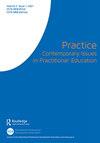Love and Social Work in the UK: A Critical Evaluation
Q2 Social Sciences
引用次数: 0
Abstract
AbstractRecently social work scholars have been exploring the concept of love and social work. A focus on love takes social work back to its roots, reinforcing care for, sensitivity and responsiveness to, the feelings of service users and relationships between service users and practitioners. Some scholars see love operating not only at individual levels, but also with action elements at structural levels challenging power, inequality, and oppression. The recent work of various international writers about social work and love is summarised. However, the concept of love and social work raises important complex, critical questions which are tentatively considered in this article. The aims of the article are to explore the concept of love as applied to professional social work, to highlight its strengths and weaknesses and offer some critical perspectives. Other aims are to begin to explore linkages between love and some existing social work theories, concepts, and values and to consider the implications of love for social work practice in statutory contexts in the UK. The role of love in social work can offer ambitious and transformative possibilities, but ambivalence, contradictions and paradox are evident; there is a need for much more debate and research about its place in the discourses of social work.Keywords: lovecaresocial workrelationshipsorganisationsstructure Disclosure statementNo potential conflict of interest was reported by the author(s).Additional informationNotes on contributorsStewart CollinsStewart Collins was employed in probation work for ten years. He has worked on social work courses in Leeds, Glasgow, Bangor and with the Open University. Correspondence to: Stewart Collins Formerly Bangor University and the Open University 19, Milton Hill, Milton, Dumbarton G82 2TS. Email: stewartcollins@blueyonder.co.uk英国的爱与社会工作:一个批判性的评价
摘要近年来,社会工作学者一直在探索爱与社会工作的概念。对爱的关注使社会工作回到其根源,加强对服务使用者感受的关怀、敏感性和反应性,以及服务使用者和从业人员之间的关系。一些学者认为,爱不仅存在于个人层面,还存在于挑战权力、不平等和压迫的结构层面。总结了近年来国际作家关于社会工作与爱情的作品。然而,爱和社会工作的概念提出了重要的、复杂的、关键的问题,这些问题在本文中被初步考虑。本文的目的是探讨爱的概念应用于专业社会工作,突出其优点和缺点,并提供一些批判性的观点。其他目标是开始探索爱与一些现有社会工作理论、概念和价值观之间的联系,并考虑在英国法定背景下爱对社会工作实践的影响。爱在社会工作中的作用可以提供雄心勃勃和变革的可能性,但矛盾、矛盾和悖论是显而易见的;有必要对其在社会工作话语中的地位进行更多的辩论和研究。关键词:关爱社会工作关系组织结构披露声明作者未报告潜在的利益冲突。附加信息关于捐助者的说明斯图尔特·柯林斯斯图尔特·柯林斯受雇做了十年的试用期工作。他曾在利兹、格拉斯哥、班戈和开放大学教授社会工作课程。前班戈大学和开放大学19号,米尔顿山,米尔顿,敦巴顿G82 2TS。电子邮件:stewartcollins@blueyonder.co.uk
本文章由计算机程序翻译,如有差异,请以英文原文为准。
求助全文
约1分钟内获得全文
求助全文

 求助内容:
求助内容: 应助结果提醒方式:
应助结果提醒方式:


